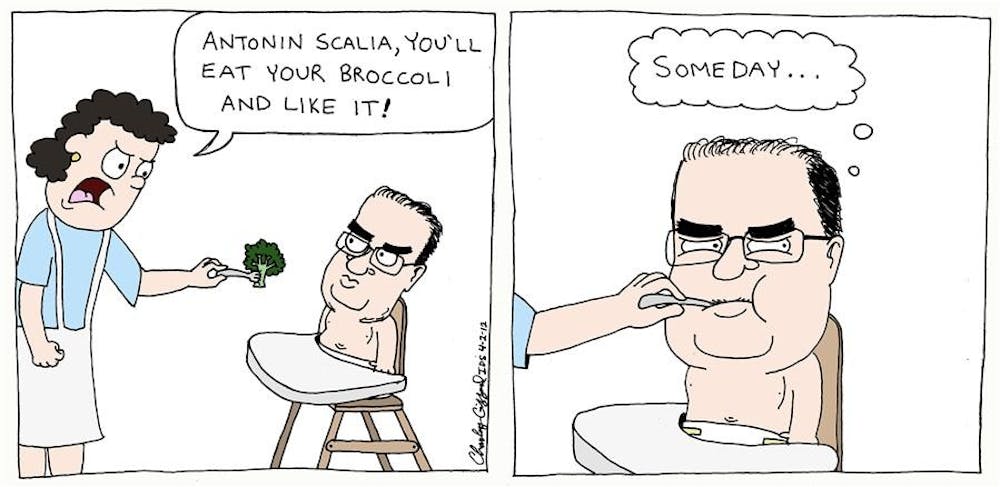Wait! Stop the presses! Put down that remote!
It’s not all over — Barack and the Supremes haven’t broken up just yet.
True, like that scene in “Dreamgirls,” the justices all crowded around the president like vultures around a corpse, eager to air their frustrations.
His manager, Solicitor General Don Verrilli, who accidently walked out of a 1950s commercial, took the brunt of the hit.
“You’ve been late, you’ve been mean, getting fatter all the time,” they might as well have told him.
“Your law is a lie! Your law is a lie! It’s a broccoli-eating, liberty-draining abomination.”
Verrilli never stood a chance. It was the spectacle of our lifetime, the stage of their dreams, and the Supremes were going to use it to their full advantage.
The air was thick with theatrics as the nine divas took their place behind the bench, ready for the primetime spotlight.
In the smoky aftermath, the pundits — who a week before were predicting the ruling 8-1 in favor of Obama — were ready to call Obamacare dead as a dormouse and declare Barack and the Supremes broken up.
Fear not, good reader, for the pundits were a step ahead of themselves.
Yes, the law stands a good chance of being struck down, but anyone who thought this fight wouldn’t be close is an idiot. The court wanted this case — wanted it bad — just for this reason.
In general, the pundits’ reading of this case has been rather flimsy.
People seem to have forgotten the court knows this case as well as any they’ve ever decided, and so its public questioning was just theater with a side of ritual sadism in which the justices get to go grill and flip the lawyers.
Although revealing, the real decisions will happen behind closed doors as Justice Stephen Breyer lobbies and Justices Anthony Kennedy and Elena Kagan join in. None of us will get to see that.
But what we can do is consider the sort of questions the justices will ponder behind closed doors.
As former justice Sandra Day O’Connor might ask, what does the
public expect?
According to polls, about two-thirds of United States citizens disagrees with the mandate. The nation is evenly split on the full Obamacare bill. The question is how much of this is built up from the noisy opposition to the bill and how much of this is a throwback to deep-set American individualism.
How might a decision in favor of Florida and the rest of the states have real-world repercussions?
Commentators have called this potentially the most impactful case of our lifetime, but other than the takedown of the law, it’s unclear what sort of immediate effects the reduction of Congress’ Commerce Clause powers would have.
On the other hand, an obscure part of the argument in which the states argued the Medicaid expansion — the new conditions the feds put on receiving federal money for Medicaid — was an infringement of their liberty could end up affecting everything from the drinking age to educational curricula.
How might the nation react to a 5-4 decision?
Everyone seems to have taken for granted that the vote will come down to a 5-4 split of the conservative and liberal factions on the court, but no one seems to have asked what might happen after that.
It seems obvious: The left would be outraged, accusing the court of being a partisan organization trying to sway the election.
The decision would rip open the scars from Bush v. Gore, a true low point in the court’s history, and place the very legitimacy of the Supreme Court onstage.
This is not something previous courts have ignored — with Planned Parenthood v. Casey famously citing the “principles of institutional integrity” as a reason for that decision — and something Chief Justice John Roberts must consider today in his court, if perhaps not as openly.
Importantly, the court’s approval rating has dropped to 46 percent.
It needs to solve the Obamacare case to preserve itself and its trust — and this, more than any reason, is why it’s not all over yet.
Justices Care more than you think

Get stories like this in your inbox
Subscribe




